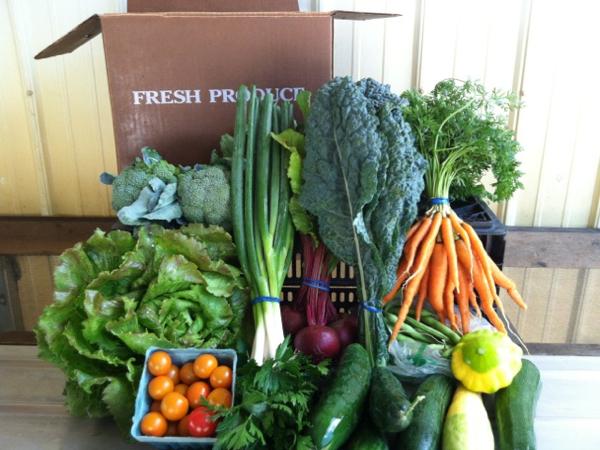Well-known farmer and author Joel Salatin once said, "Don't you find it odd that people put more work into choosing a mechanic or contractor than into choosing the person who grows their food?"
Let's change that.
There are many ways to create connections with local farmers, from shopping at co-ops to frequenting farmers markets that feature locally grown produce. But to really get to know the people who grow your food from seed to harvest, consider a community supported agriculture (CSA) share. (For a quick primer on CSAs, zip over to this article for a CSA 101 description.)
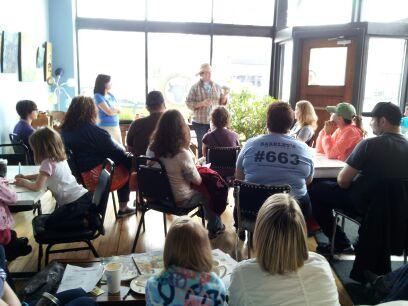 Member meetup for Bossy Acres CSACSAs are designed to foster a network of supporters for a farm — hence, the "community supported" description — and provides a model that often allows a farmer to buy seeds, equipment, and supplies before the season begins. People become "members" of a farm, and if all goes well with the harvest, they'll get a box of vegetables either every week or every other week, depending on how the CSA is set up.
Member meetup for Bossy Acres CSACSAs are designed to foster a network of supporters for a farm — hence, the "community supported" description — and provides a model that often allows a farmer to buy seeds, equipment, and supplies before the season begins. People become "members" of a farm, and if all goes well with the harvest, they'll get a box of vegetables either every week or every other week, depending on how the CSA is set up.
But for a farmer, CSA members are more than customers, they truly become partners in a sometimes risky venture. That feeling of support and encouragement throughout the season is vital for working through some very tough days.
Even with all that happy, groovy goodness flowing, though, CSAs aren't for everyone. Some people find that they can't keep up with the amount of vegetables that come in regularly, or they don't want to deal with kohlrabi or radishes. Others might travel often and can't coordinate pickups. But if you're craving a deeper connection with the people who grow your food, they can be an ideal way to expand your culinary horizons, and to support your local farmer directly.
With the number of CSAs offered, it can be daunting to choose a farm and CSA share that's right for you. So here are some quick tips for making the process easier:
Research local drop sites: If you live in St. Paul, chances are that you're not going to be happy supporting a farm that offers Minnetonka as the closest drop site. And that's okay, because there are plenty of options near you. Start with the Land Stewardship Project's handy tool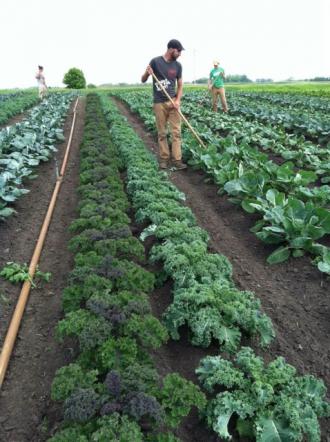 Employees weeding at Loon Organics to narrow down choices, but also ask around. Most, if not all, co-ops have farms that drop at their locations, and so do some coffee shops, farmers markets, churches, and member homes. If you have enough friends or colleagues who are interested in a CSA, consider having your work or house as a drop site, and approach a CSA farm to ask if they need more sites.
Employees weeding at Loon Organics to narrow down choices, but also ask around. Most, if not all, co-ops have farms that drop at their locations, and so do some coffee shops, farmers markets, churches, and member homes. If you have enough friends or colleagues who are interested in a CSA, consider having your work or house as a drop site, and approach a CSA farm to ask if they need more sites.
Get the farm vibe: When looking around for CSAs, it's likely that some farms will resonate with you more than others. Not all CSA farms have chemical-free practices (although the majority do, even if they're not certified organic) so look for that information if it's important to you. Flip through photos on Facebook or farm websites and look at past newsletters if they're available online — do they offer recipes and resources for cooking? Are there multiple farm events? Do they have add-on partners that give you more opportunities for ordering local food? Decide what's important to you in terms of being a member, and go from there.
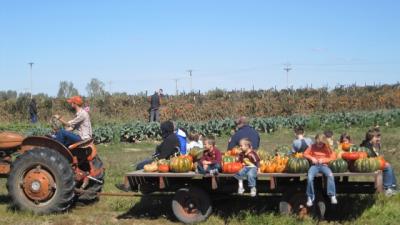 Find out about farm events if you want to participate in thoseConsider distance for on-farm volunteering and events: If you're the type who wants deeper involvement in your farm, like attending member events and getting your hands dirty during the season, distance is going to be a factor. If you want to volunteer a couple times per month, but the farm is four hours away, think about that commitment. Some members are perfectly happy never visiting the farm, and that's fine, because support takes many forms. But if you're really looking forward to weeding alongside the farmers (always encouraged!), a closer farm might be a better choice.
Find out about farm events if you want to participate in thoseConsider distance for on-farm volunteering and events: If you're the type who wants deeper involvement in your farm, like attending member events and getting your hands dirty during the season, distance is going to be a factor. If you want to volunteer a couple times per month, but the farm is four hours away, think about that commitment. Some members are perfectly happy never visiting the farm, and that's fine, because support takes many forms. But if you're really looking forward to weeding alongside the farmers (always encouraged!), a closer farm might be a better choice.
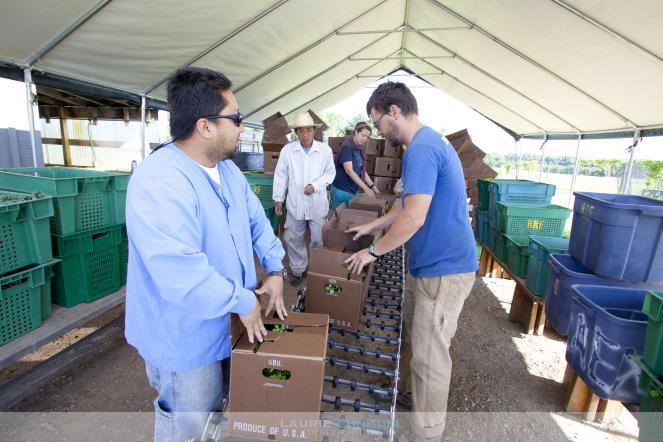 CSA box packing at Big River FarmsUnderstand the pricing: There are numerous articles about CSAs that imply you'll be getting a big discount by going with a CSA as opposed to a farmers market or co-op. Some weeks, that might be true, especially if heirloom tomatoes are involved. But in general, farmers need to price their product appropriately or they'll go out of business, and that means you're not going to get $100 worth of vegetables for $20. Nor should you: part of CSA membership means supporting a farmer economically, not just through sentiment. Farmers price their shares as reasonably as possible, and you often end up paying slightly less than you would if you bought all the items individually, but the cost isn't radically lower. So, if you're looking for bargain-basement pricing on your vegetables, fruits, or meats, go to Costco. If you want to strengthen local food access and chemical-free growing practices, get a CSA.
CSA box packing at Big River FarmsUnderstand the pricing: There are numerous articles about CSAs that imply you'll be getting a big discount by going with a CSA as opposed to a farmers market or co-op. Some weeks, that might be true, especially if heirloom tomatoes are involved. But in general, farmers need to price their product appropriately or they'll go out of business, and that means you're not going to get $100 worth of vegetables for $20. Nor should you: part of CSA membership means supporting a farmer economically, not just through sentiment. Farmers price their shares as reasonably as possible, and you often end up paying slightly less than you would if you bought all the items individually, but the cost isn't radically lower. So, if you're looking for bargain-basement pricing on your vegetables, fruits, or meats, go to Costco. If you want to strengthen local food access and chemical-free growing practices, get a CSA.
Know the risks: In order to explain the CSA model, some people call it a subscription. But it's not. Using the term "subscription" implies a guarantee, which might lead people to believe that they'll get their money back if the crops get wiped out. Instead, a CSA is more like buying shares in a company — that's why participants are called members and not subscribers. You get the rewards, but you also get the 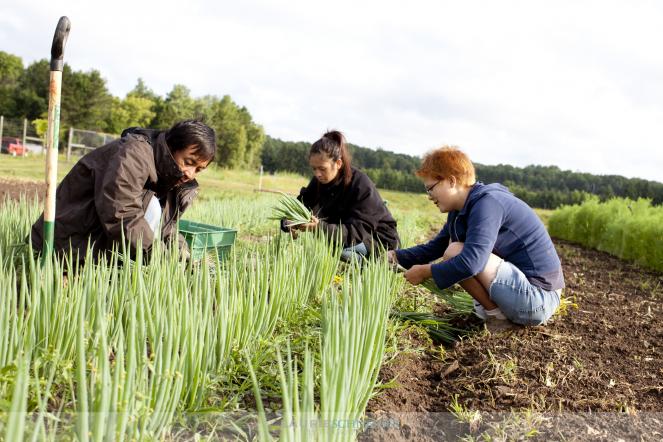 Summer field work at Big River Farmsrisks. Farmers will often work for 10 to 15 hours per day, every day, during the season to implement strategies that mitigate risk, but let's face it: fields get flooded, hailstorms whip through crops like weed whackers, and pests are a constant, particularly in organic systems. Your support is hugely important to keep farmers solvent, and sometimes that support comes at a price.
Summer field work at Big River Farmsrisks. Farmers will often work for 10 to 15 hours per day, every day, during the season to implement strategies that mitigate risk, but let's face it: fields get flooded, hailstorms whip through crops like weed whackers, and pests are a constant, particularly in organic systems. Your support is hugely important to keep farmers solvent, and sometimes that support comes at a price.
In general, go into a CSA knowing how the share system works, and at least a little something about the farmers. Consider getting involved not just with your money, but also with your time. Step up and become a community member, not just a customer. Knowing who grows your food makes it much easier to celebrate every bite.
Are you a member of a CSA farm that you love? Let us know about it in the comments!

